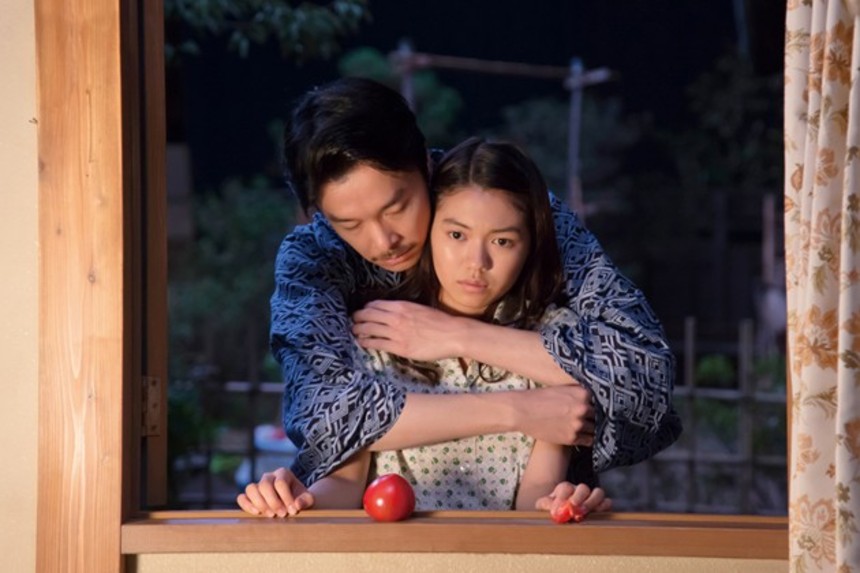Japan Cuts 2015 Review: THIS COUNTRY'S SKY, Love And Coming of Age In A Time Of War

In the 70 years since the end of World War II - or, more precisely, what will be 70 years this August - there have been countless cinematic depictions of the war, covered from just about every possible angle. Some of the more compelling ones concern how the war affected ordinary citizens, those who were not soldiers, or had any ideological investment, but were just as caught up in the conflict as anyone else.
This Country's Sky, which had its world premiere at this year's Japan Cuts festival, is one that tackles this particular perspective. Directed by Arai Haruhiko - an acclaimed screenwriter returning to the director's chair after an 18-year absence - and based on the 1983 Tanizaki Junichiro Prize-winning novel, it depicts the everyday struggles of ordinary Japanese during the waning days of the war. Set in the Suginami section of Tokyo in 1945, the atmosphere is one of increasingly extreme privation, meager rations, people bartering for goods instead of using money, daily air raid announcements, and running to and from bomb shelters. Visually, the film reflects the depressed, resigned state of the people within; it has a subdued palette, nearly drained of color, metaphorically suggesting the mood of Japan at large.
These events are mostly seen through the eyes of Satoko (Nikaido Fumi), a 19-year-old woman who lives with her widowed mother (Kudoh Youki), and who works as a clerk at the local civil defense office, overseeing evacuation requests by those who seek to escape the more dangerous areas of the conflict. In normal times, a young woman like her would be making marriage arrangements; Satoko herself had desires to work as a teacher. But the war has violently interrupted all of that; just like all those around her, daily survival is the necessary preoccupation of her existence.
Some of Satoko's only distractions from her daily struggles come in the form of her next-door neighbor Mr. Ichikawa (Hasegawa Hiroki), a married man whose wife is away doing work for the war effort. She likes listening to him play the violin, and is becoming drawn to him despite the fact that he's exactly twice her age. Ichikawa escaped being drafted for the war because he was deemed physically unfit. Despite this, he's become rather death obsessed, anticipating that in these latter days of the war, with massive casualties, that a Japanese army desperate for soldiers will lower their standards and call him up, despite his age and low recruitment status. He talks of going to places that have been bombed and reports in detail on the dead bodies he's seen, both the unrecognizably charred ones on the ground and the more peaceful-looking ones floating on the water.
Meanwhile, Satoko has problems to contend with at home, when her aunt arrives, escaping her bombed-out town and having lost her husband and child. She seeks shelter at her sister's home; Satoko's mother is reluctant to take her in, since her sister's presence, and attendant needs, will strain their already limited resources. The passing days will see the sisters increasingly arguing with each other over this.
The later passages of the film concentrate more and more on Satoko's sexual blossoming, and her increasing closeness with Ichikawa. She is well aware that Ichikawa's wife - and their child - will return after the war, but this doesn't lessen her desires, making it inevitable that her current status as a virgin will soon come to an end.
This Country's Sky is a stately, slow-moving, and solemn drama, populated by characters who try to live normal lives but are paralyzed by fear of being destroyed in a bomb attack, and are constricted by lives of poverty and scarcity. This bearing down on the depressed moodiness of the time presents some dramatic problems in the early scenes, as the downbeat atmosphere threatens to become suffocating and monotonous. However, once the emphasis shifts to Satoko's coming-of-age journey, more variations and color enter the picture, and things become much more interesting.
The film has some fine performances, first and foremost Nikaido Fumi as the central character, who is, as always, riveting and impossible to take one's eyes off of. While this isn't the best film she's appeared in, this only confirms the incredible range and great talent of this young actress. She's a busy one, too: This Country's Sky is just one of three films of this year's Japan Cuts festival that she appears in; A Farewell to Jinu and the opening film Hibi Rock: Puke Afro and the Pop Star are the others. Just like This Country's Sky, those other two films have flaws holding them back from being truly great, but Nikaido's presence almost single-handedly makes them worth seeing.
Kudoh Youki, who most Western audiences will remember from Jim Jarmusch's Mystery Train, delivers an equally great performance as Satoko's mother, wonderfully depicting a woman refuses to be broken by her difficult life, and who is a solid, earthy presence, cutting through much of the overly genteel nature of this film.
The alternative title of This Country's Sky is "When I Was Most Beautiful." That phrase refers to a poem Satoko reads over the closing credits, which follows the film's final shot, which feels very much like an homage to Truffaut's The 400 Blows, which ends almost exactly the same way, in a freeze-frame close-up. Satoko's poem is a self-requiem, lamenting the death, destruction, and poverty that accompanied the peak of her beauty and vitality. These final words are a potent symbol of the tragic consequences of the war on Japan's landscape and collective psyche.

Do you feel this content is inappropriate or infringes upon your rights? Click here to report it, or see our DMCA policy.






